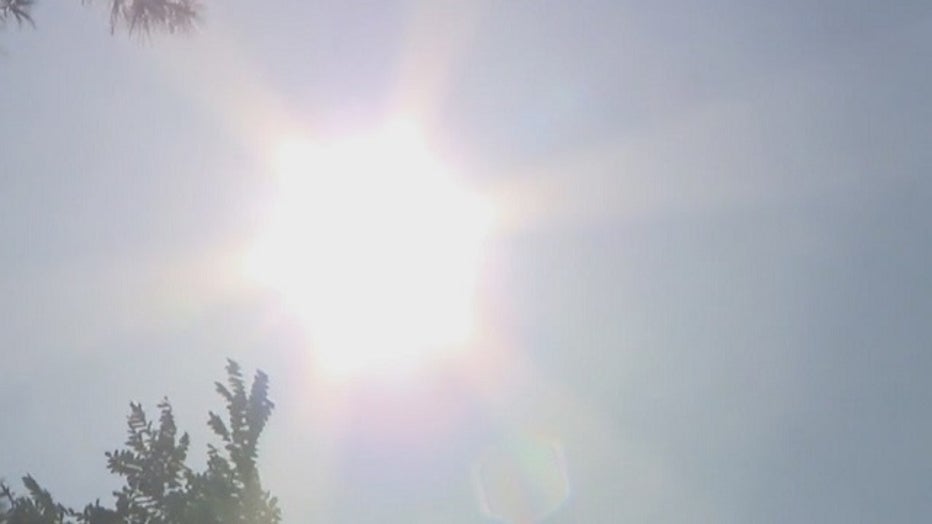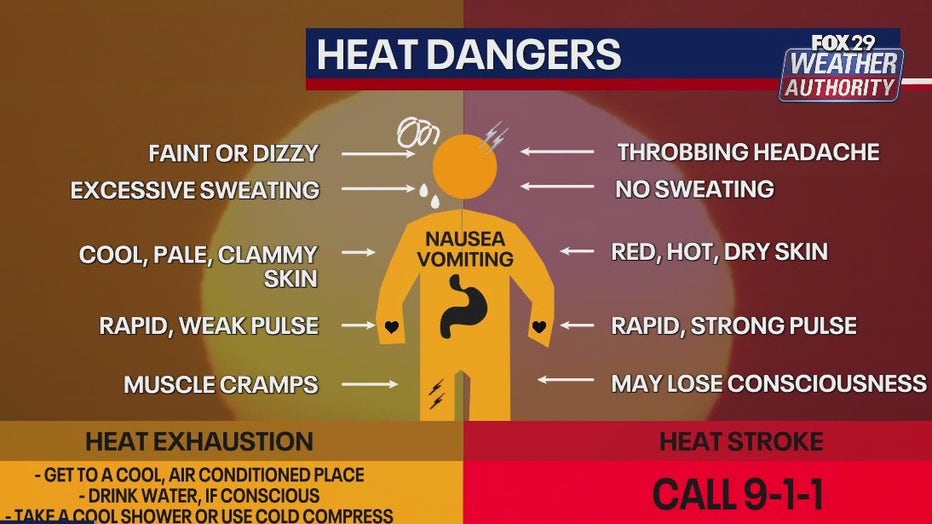Extreme Heat Warning: What to know ahead of dangerous heat in Philadelphia area

Weather Authority: Saturday Night Update
FOX 29's Drew Anderson has a look at the forecast as a dangerous heat wave looms.
PHILADELPHIA - Now that the Delaware Valley is seeing the first official day of summer, an Extreme Heat Watch has already been issued for nearly the entire region, as we are set to see a long-duration, dangerous heat wave.
Additionally, the City of Philadelphia has issued a Heat Health Emergency from Sunday through Wednesday.
And, the Pennsylvania Department of Environmental Protection (DEP) has issued a Code Orange Air Quality Action Day for Sunday, June 22nd, in Bucks, Chester, Delaware, Montgomery and Philadelphia counties. Conditions Sunday will see fine particle pollution concentrations that will be in the lower to middle moderate range.
Those sensitive, including kids, the elderly and anyone with respiratory problems should limit their time outdoors on Sunday.

Extreme Heat Warnings and Watches
What we know:
As summer is now officially beginning, the Delaware Valley is bracing for a dangerous, long-duration heat wave.
Saturday will see plentiful sunshine as temps aim for 90 degrees, or a little above.
Sunday will likely be brutal, as humidity soars along with temperatures, which will likely reach close to 100.

Monday and Tuesday will be worse, with oppressive heat topping 100 degrees, something the region hasn’t seen for over a decade.
Extreme Heat Warnings and Watches have been issued for nearly the entire region from Sunday at 8 a.m. to Wednesday at 8 p.m. due to oppressive heat setting up.
The heat will likely not release its grip until Friday.

The backstory:
According to the EPA (Environmental Protection Agency), more than 14,000 Americans have died as a result of heat-related causes since 1979.
Heat-related deaths reached new high levels beginning in 2021, which was one of the hottest years on record in the contiguous 48 states.
Heat kills more people than other weather phenomena.

Philly residents plan for extreme heat
As a dangerous heat wave sets up to envelope the region, Philly residents make plans for staying cool.
How to stay safe in extreme heat
What you can do:
Take steps to protect yourself and your loved ones as the oppressive heat sets up. The heat can really take a toll on your body and know that if it is too hot for you, it is too hot for your children and your pets.
- Check on the elderly and check on your neighbors.
- Make sure your car, your air conditioning and your home are all prepped and in good order.
- Take breaks from the sun if you are going to be outdoors for any length of time.
- Wear sunscreen.
- Drink water – stay hydrated. Drink more water than you normally would.
- Slow down.
- Stay in air conditioning.
- Wear lightweight clothing.
- Close your blinds and curtains.
- Never leave your children, pets or anyone in a parked car for any length of time.
- If you must walk your dog, do it very early. Check the pavement with your hand – if it’s too hot for your hand, it’s too hot for your dog’s paws.

The Centers for Disease Control has a heat and health tracker, which you can find here, which provides more tips to stay safe in the heat.
The National Weather Service has a HeatRisk page on their website, here, which can help understand the weather conditions over seven days and how it can affect you.
The Red Cross has information, tips and resources on heat-related issues which can be found here.
Dr. Mike Cirigliano, with the University of Pennsylvania, explained, "With very young people, they have a different kind of surface area and they can get in trouble quicker. The very elderly, many are on medications. They can get dehydrated. They can get in big trouble very quickly."
In Philadelphia, a city of rowhomes, many with old thick tar roof tops, that can seal heat in like a convection oven, experts say if seniors keep windows shut and don’t run air conditioning, fearing high electric bills, city leaders say it’s a terrific idea for neighbors to check in and look out for each other.
Heat illness symptoms
You will know you are experiencing heat cramps if you are sweating heavily and feeling muscle pain. You should immediately stop what you are doing and rest in a cool place while sipping water slowly. Don’t gulp the water. If you are feeling sick, don’t drink water.
You will know you are experiencing heat exhaustion if you are sweating heavily, have cool and clammy skin, muscle cramps, dizziness, fainting, nausea or vomiting. Much like with heat cramps, stop what you are doing and rest, while sipping water. Also, you could apply a wet cloth to your body.
Heat stroke is deadly and is prompted by a high body temperature, a rapid heartbeat, confusion, headache, dizziness, fainting, nausea and vomiting. Call 911 if you are experiencing these symptoms. Do not drink anything.
If you are experiencing any symptoms, take precautions to stay healthy or call 911.

Where to find a cooling center near you
If you or someone you know or a neighbor is in danger or needs help in this extreme heat, the region provides cooling centers for those needing a cool place to be.
- Philadelphia provides cooling centers during Heat Health Emergencies and locations can be found here
- Bucks County cooling centers
- Chester County cooling centers and heat plan
- Delaware County heat plan and cooling centers
- Montgomery County cooling centers
- New Jersey cooling centers by county can be found here
- New Castle County heat emergency plans and how to get help can be found here

